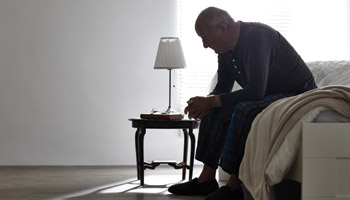Dementia care poses ethical quagmires
Dementia presents unique ethical challenges for physicians because it is a “disease of autonomy.”
Physicians who care for patients with dementia must deal with decisions that are challenging not only clinically, but ethically, ranging from diagnostic disclosure to end-of-life decisions.
“Each physician must put the patient's interests before their own and care for patients ethically,” said Janet A. Jokela, MD, MPH, FACP, Chair of ACP's Ethics, Professionalism, and Human Rights Committee. “It's incumbent on each and every one of us to put that front and center as we care for patients, and especially as we care for patients with this diagnosis.”

This can be especially tricky when dealing with a “disease of autonomy” like dementia, said Jason Karlawish, MD, professor at the Perelman School of Medicine at the University of Pennsylvania and co-director of the Penn Memory Center in Philadelphia. “I would want all doctors, regardless of their field, who encounter persons living with dementia to recognize that of all the diseases, this one is unique.”
Diagnostic disclosure, care partners
To Eric Tangalos, MD, FACP, a geriatrician at the Mayo Clinic in Rochester, Minn., the primary ethical issue in dementia care is diagnostic disclosure. “That's one of the biggest hurdles we all have,” he said, noting that physicians tend to ease around the diagnosis due to discomfort or lack of time, often doing a disservice to both the patient and the health care system in the process.
Run toward the diagnosis rather than away from it, Dr. Tangalos advised. “Once you've approached the diagnosis, once you've disclosed what you actually think it is, instead of trying to soft coat it, you've got a better chance of trying to deal with the other issues that the patient and family have.”
It takes a tremendous amount of effort to start a formal discussion with patients and families, he acknowledged. “It's much easier to say it's ‘mild cognitive impairment’ with a lower case ‘m, c, i’ instead of upper case ‘M, C, I,’ which truly is a diagnosis that precedes Alzheimer's disease,” he said.
Ensuring that a patient with dementia has adequate support in the form of a care partner is another ethical obligation of the physician, said Margaret A. Noel, MD, FACP, a geriatrician and founder of MemoryCare in Asheville, N.C. She urges all of her patients with dementia to enlist a trusted family member or friend to come with them to appointments and play an active role in their care.
“Mature adults usually understand that they may need a surrogate decision-maker to assist with health care decisions. I have never ever had one refuse me the opportunity to engage their care partner,” she said. “It's not natural in our medical training to think about that until there is a crisis. With dementia, you really need to engage that care partner from the beginning, and that will make the lives of the patient, the caregiver, and the physician so much better.” A caregiver can help remember necessary safety and health information, make certain the care plan is implemented, communicate issues that the person with dementia may not remember to relay, and advocate to honor the patient's goals for future care, she said.
“Patients with dementia are not able to advocate for themselves, so it's imperative that there is someone available who can do so,” Dr. Jokela said. “The primary ethical issue is ensuring there is someone in place to make decisions on behalf of the patient, in the patient's best interests.”
Dr. Karlawish recommended keeping in mind that the patient's autonomy is linked to the caregiver. “Speak to the person and talk to the person living with dementia, but on the other hand, recognize that for the person living with dementia, their autonomy is in a relationship with someone else,” he said. “And so, an office visit needs to be structured in a way that gives both of them time.”
When a patient has no designated care partner and is experiencing harm due to self-neglect or abuse and exploitation, Dr. Karlawish said, the physician has a responsibility to contact Adult Protective Services. “This might result in guardianship, which has its own set of problems, but a person with dementia who ‘has no one’ and is a victim of poor care or exploitation needs our help,” he said.
Day-to-day dilemmas
Decisions around driving, financial independence, and living situations are common for dementia patients.
“The problem is when a cognitive disorder sets in, we also typically lose insight and still believe we're safe,” Dr. Noel said. “So, in a progressive dementia, a physician will need to make multiple capacity judgments about things like driving safety or need for medication and nutritional oversight for the welfare of their patient, but they also must have the engagement of a caregiver to enforce a plan of care that recognizes these changing capacities. Financial oversight is another such area. Independent adults really do not want others telling them how to spend their money. Yet, older adults with cognitive impairment are often victims of elder fraud, particularly disproportionate to other adults.”
Physicians are required to report suspected elder abuse to the proper authorities, though this is never an easy thing to do, said Dr. Karlawish. “I've had to contact Adult Protective Services because I'm concerned that a family is just simply not doing what's right for the patient. Oftentimes that's around financial matters. Their financial resources are being misappropriated for other purposes.”
Physicians are also often put in a catch-22 type of situation, according to Dr. Tangalos, regarding decisions around driving. “If they tell a patient … ‘You can't drive,’ the patient and the family may just fire the physician and that may leave the patient without any provider at all. So, there's a fine line in determining what to say, what not to say.”
Ultimately, he said, “we have to try to put the best interest of the patient in the context of what the societal needs are as well. You can't just protect the individual.”
Dr. Karlawish said he tells his patients that a day should be as safe, social, and engaged as possible, recognizing that the goal should be balance. “You can't have a day that's totally safe and also completely social and totally engaged,” he said, giving the example of riding a motorcycle as potentially social and engaged but not safe.
Decisions about changes such as participating in adult day activity programs or moving to a nursing home can be particularly difficult, Dr. Karlawish said. “Patients often say ‘no,’ and I have to spend time educating the family about how to think about the patient's capacity to make that decision,” he said. “This kind of plays into the larger theme of how to present options and create an environment for a patient that maximizes their welfare and well-being and dignity. This can sometimes run up against matters of truth telling—how to tell the truth in ways that respect the patient as a person but recognize that oftentimes understanding facts can become more complicated.”
Detailed care plans, end-of-life issues
Care plans that are thought out ahead of time can help physicians and families work to make decisions for patients with dementia when they can no longer do so themselves.
Primary care physicians are at an advantage here, said Dr. Noel, because they know their patients' values. Setting aside a visit for advance care planning can aid the physician in helping not only the patient but the caregiver as well, especially toward the end of life or during an acute health crisis, she said.
Dr. Jokela said this type of planning can be especially helpful when the patient's original wishes might conflict with the current circumstance. “There may be something the patient wanted or was really important to them, but as the disease progresses, it may not be feasible to pursue or to do whatever it is the patient sought,” she said. “In that case, having as much information ahead of time as possible will be helpful, because there may be other aspects of the patient's wishes which could come into play and help guide the way forward.”
Still, patients, caregivers, and clinicians need to understand that a certain amount of leeway is still required and that factors other than the advance directive may need to be considered. The decision-making process is usually more positive if a caregiver is able to exercise some judgment, “rather than just saying, ‘Well, she said she wanted X, so I guess I have to do that,’” said Dr. Karlawish.
If disagreements arise between family members, Dr. Tangalos advised letting them all have their say and guiding the conversation toward a productive decision. “You have to live in the moment with the people that are there,” he said. “For the most part, I always tell families I'd rather have them there than not have them there. They actually give me more information and more support, even if it's discordant.”
In situations that can't be resolved through discussion, Dr. Noel notes that hospital and long-term care bioethics committees can help with decision making. “This has helped me in situations where there is discord in a family about what is best to do and the patient's wishes aren't that clear or may have been appropriate for another clinical future than what they're experiencing,” she said. “That's a helpful process, because dementia is not black and white. It never is.”
Toward the end of life, Dr. Tangalos said ethical questions arise regarding when to call a patient's hospitalization their last. “That oftentimes isn't as dependent on the patient as much as it is on the family,” he said. “When do we rescue mom once again from an E. coli sepsis when she's got far advanced Alzheimer's disease?”
Dr. Jokela added that nutrition is a big issue toward the end of life, when many patients with dementia are no longer able to feed themselves. “This may in part go back to the patient's original wishes. Discussing current recommendations in an open manner with the family and what approaches would be most comfortable and most humane is critically important so patients may be treated with respect and dignity in their final days.”
Ultimately, detailed documentation by clinicians is vital, Dr. Jokela stressed. When a care plan is clear and transparent, “physicians and providers will know exactly what's going on and what's important, so they can use that information to provide excellent and compassionate care of the patient,” she said.




